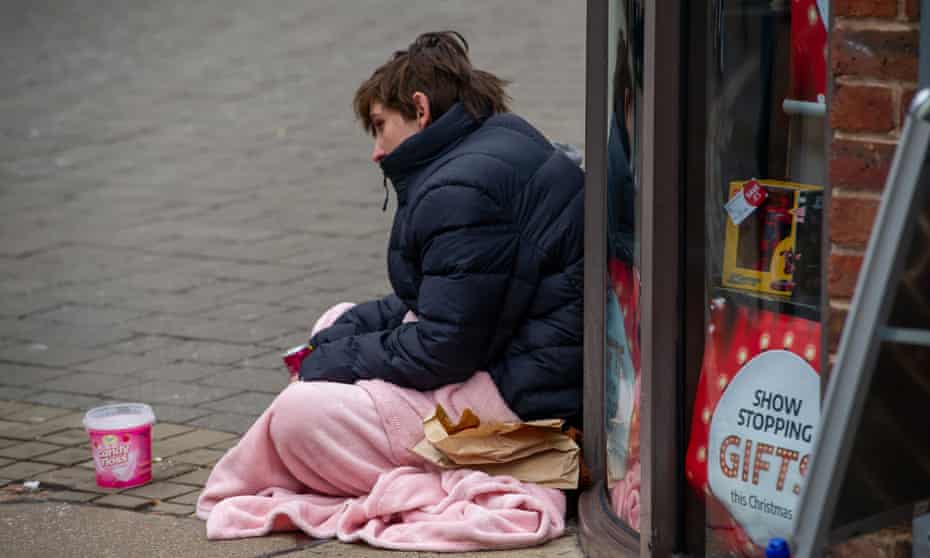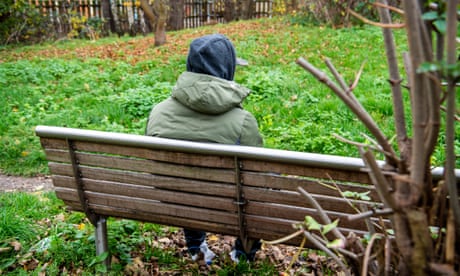Rise in number of sofa surfers expected to drive the increase as councils warn of ‘tidal wave’ of need

More than 66,000 more people will become homeless by 2024, according to the housing charity Crisis.
Photograph: Maureen McLean/REX/Shutterstock
Robert Booth
Robert Booth
Social affairs correspondent
THE GUARDIAN
Tue 22 Feb 2022
The number of people homeless in England is predicted to jump by a third by 2024 as councils warn of a “tidal wave” of need caused by benefits freezes, soaring food and energy bills and the end of Covid eviction bans.
More than 66,000 more people will be homeless by 2024, with the bulk of the increase being among people forced to “sofa surf”, according to annual forecasts by the housing charity Crisis and Heriot-Watt University. There will be 8,000 more people rough sleeping and 9,000 people forced into unsuitable temporary accommodation.

One pay packet away from the streets: the workers who became homeless in the pandemic
The chief executive of Crisis, Matt Downie, described the findings as “a huge cause for concern”, as a survey of 155 English councils also found that nine out of 10 town halls expect to see an increase in evictions from private rented homes over the next year. Eight out of 10 fear increases in homeless children.
“We are expecting a tidal wave, to put it mildly,” an official at one council in southern England told the researchers. “It is going to be a very, very busy couple of years.”
Councils in London, where living costs are highest, are predicting the biggest surge.
The bleak projections come as government measures to prevent homelessness during the pandemic unwind. Core homelessness in England – a concept which captures the most acute forms of homelessness – is estimated to have totalled 203,400 in 2020, down 5% on 2019 levels.
This was primarily due to the widely praised “Everyone In” initiative during the pandemic which saw rough sleepers housed in hotels. But this measure is now predicted to rise to 270,000 by 2024 and reach close to 300,000 by 2036, unless further countermeasures are taken.
Evictions slumped during the pandemic, as ministers paused court proceedings, but are now increasing again. There were more than 14,000 possession claims between October and December last year, a 42% rise on the previous quarter.
Energy price rises this spring forecast at over 40% will hit single-adult households on low incomes hardest. They could be forced to spend 54% of their income on bills compared with 6% for a middle-income family, according to estimates by the Joseph Rowntree Foundation.
“It doesn’t have to be like this,” said Downie. “The protections put in place during the pandemic helped thousands of people off the streets and prevented many more from facing homelessness. It would be shameful for this progress to unravel before us, at a huge human cost and a financial one for the local councils left to foot the bill.”
In December, the government announced a £316m homelessness prevention fund for councils for the next financial year that it said would protect tens of thousands of people from homelessness. It was welcomed by Crisis and the founder of the Big Issue, John Bird.
But Crisis is calling on the government to further increase the Local Housing Allowance – the amount the state will pay to cover rent for people on benefits – so it truly covers the cost of rent across the country. The allowance was rebased at 30% of market rents in spring 2020 but was frozen from April 2021.
It also repeated its call for more social housing to be built. Only 5,955 new homes for the cheapest social rents were provided in England 2020/21, down from nearly 40,000 a year a decade ago.
A Department for Levelling Up, Housing and Communities spokesperson said: “Government interventions have prevented almost 450,000 households from becoming homeless since 2017.
“This year, councils have been given an extra £65 million to support low income households with rent arrears.
“We’re also banning no-fault evictions, and a £316 million homelessness prevention grant will help people who are homeless or at risk of losing their home to find a new one, get help with evictions or move into temporary accommodation.”
Tue 22 Feb 2022
The number of people homeless in England is predicted to jump by a third by 2024 as councils warn of a “tidal wave” of need caused by benefits freezes, soaring food and energy bills and the end of Covid eviction bans.
More than 66,000 more people will be homeless by 2024, with the bulk of the increase being among people forced to “sofa surf”, according to annual forecasts by the housing charity Crisis and Heriot-Watt University. There will be 8,000 more people rough sleeping and 9,000 people forced into unsuitable temporary accommodation.

One pay packet away from the streets: the workers who became homeless in the pandemic
The chief executive of Crisis, Matt Downie, described the findings as “a huge cause for concern”, as a survey of 155 English councils also found that nine out of 10 town halls expect to see an increase in evictions from private rented homes over the next year. Eight out of 10 fear increases in homeless children.
“We are expecting a tidal wave, to put it mildly,” an official at one council in southern England told the researchers. “It is going to be a very, very busy couple of years.”
Councils in London, where living costs are highest, are predicting the biggest surge.
The bleak projections come as government measures to prevent homelessness during the pandemic unwind. Core homelessness in England – a concept which captures the most acute forms of homelessness – is estimated to have totalled 203,400 in 2020, down 5% on 2019 levels.
This was primarily due to the widely praised “Everyone In” initiative during the pandemic which saw rough sleepers housed in hotels. But this measure is now predicted to rise to 270,000 by 2024 and reach close to 300,000 by 2036, unless further countermeasures are taken.
Evictions slumped during the pandemic, as ministers paused court proceedings, but are now increasing again. There were more than 14,000 possession claims between October and December last year, a 42% rise on the previous quarter.
Energy price rises this spring forecast at over 40% will hit single-adult households on low incomes hardest. They could be forced to spend 54% of their income on bills compared with 6% for a middle-income family, according to estimates by the Joseph Rowntree Foundation.
“It doesn’t have to be like this,” said Downie. “The protections put in place during the pandemic helped thousands of people off the streets and prevented many more from facing homelessness. It would be shameful for this progress to unravel before us, at a huge human cost and a financial one for the local councils left to foot the bill.”
In December, the government announced a £316m homelessness prevention fund for councils for the next financial year that it said would protect tens of thousands of people from homelessness. It was welcomed by Crisis and the founder of the Big Issue, John Bird.
But Crisis is calling on the government to further increase the Local Housing Allowance – the amount the state will pay to cover rent for people on benefits – so it truly covers the cost of rent across the country. The allowance was rebased at 30% of market rents in spring 2020 but was frozen from April 2021.
It also repeated its call for more social housing to be built. Only 5,955 new homes for the cheapest social rents were provided in England 2020/21, down from nearly 40,000 a year a decade ago.
A Department for Levelling Up, Housing and Communities spokesperson said: “Government interventions have prevented almost 450,000 households from becoming homeless since 2017.
“This year, councils have been given an extra £65 million to support low income households with rent arrears.
“We’re also banning no-fault evictions, and a £316 million homelessness prevention grant will help people who are homeless or at risk of losing their home to find a new one, get help with evictions or move into temporary accommodation.”
No comments:
Post a Comment